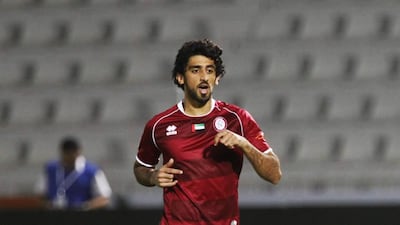It has been a revealing few days for the UAE national team.
A 26-man squad for a training camp in Austria has been announced, with one or two surprises, and the draw for the 22nd Gulf Cup of Nations in Saudi Arabia – the reason for the camp – was made on Tuesday night.
A strong core of the Under 23 squad, which performed so valiantly at the 2012 London Olympics and then stormed to victory at the 2013 Gulf Cup in Bahrain, is still there.
Stability and continuity among the group are high on Mahdi Ali’s list of priorities.
On Tuesday, the squad flew to Austria for the 25-day training camp, which includes a friendly against Norway in Oslo on August 27 and friendlies in Austria against Lithuania on September 3 and Paraguay on September 7.
In the first of the matches, Mahdi Ali will do without the squad’s Al Ain contingent, who are involved in a two-legged AFC Champions League quarter-final against Al Ittihad of Saudi Arabia, at home on August 19 and in Jeddah on August 26.
Omar Abdulrahman, Khalid Essa, Mohammed Ahmed, Mohaned Salem, Ismail Ahmed and Mohammed Fawzi will join up with the UAE squad on August 27.
There is still enough on that list, and off it, to raise interest.
Hamdan Al Kamali, once one of the country’s rising stars, has been left out of the squad. His international career trajectory continues to dip since spending six months on loan at Lyon in 2012 and playing at the London Olympics.
The big Al Wahda defender, perhaps physically the most suitable Emirati footballer for a career at one of Europe’s competitive leagues, has suffered from injuries and bad form during the past two years.
At the Gulf Cup last year, he started the first two matches but then lost his place for the last group fixture.
He also sat out the semi-final against Kuwait and the extra-time final triumph over Iraq. Since then, his form for the UAE on the occasions he has started has been patchy.
Al Kamali risks missing out on what could be a defining period for the national team.
With the Gulf Cup followed by the 2015 AFC Asian Cup in Australia in January, the UAE are approaching arguably the most important six months since Mahdi Ali took over. Beyond that, the serious business of qualifying for the 2018 World Cup in Russia begins next year.
The new Golden Generation could end up missing one of its original members.
At the other end of the spectrum, two Baniyas players will be hoping their return to the squad will prove a turning point for their fortunes.
Amer Abdulrahman, one of the standout players at the Gulf Cup triumph, had a 2013/14 to forget. A trial with Blackburn Rovers last summer did not lead to a move and injury kept him out for long periods as his club struggled in the Arabian Gulf League and finished ninth.
Yet the value of a fit and firing Abdulrahman cannot be overstated for the UAE national team. The midfielder formed a formidable partnership with his namesake Omar to be the base on which Mahdi Ali’s possession-based football is built.
Even in the absence of the Al Ain playmaker, his partner stepped up. In the early qualifying fixtures for London 2012, he was a standout player.
With a new contract signed at his one and only club, who have kept at bay approaches from the likes of Al Ain and Al Ahli, this is a new beginning for Amer Abdulrahman, domestically and at international level.
His Baniyas teammate, Ahmed Ali, has had an even worse time. He scored the only goal in a crucial victory over Iraq in qualifying for London and made the Olympic squad. He did not make the final 23 for Bahrain, however, and subsequently disappeared from the international scene.
His return may be as backup and to cover for the absence of the Al Ain players, but it shows that he remains on Mahdi Ali’s radar.
This is good news for Al Kamali.
Mahdi Ali has shown unwavering loyalty to a group of players he led from the U19 age group to the present day.
Injuries and temporary loss of form are no barrier to a recall to the squad. The return of Ahmed Ali, in particular, and the continued presence of the talented but inconsistent Ahmed Khalil, is proof of that.
Now 25, Al Kamali is running out of time to convert his undoubted potential into consistent performances, as Omar Abdulrahman and others have done. The next six months could be the most important of his career.
Indeed, they could be for every one of Mahdi Ali’s chosen 26.
akhaled@thenational.ae
Follow our sports coverage on Twitter @SprtNationalUAE

